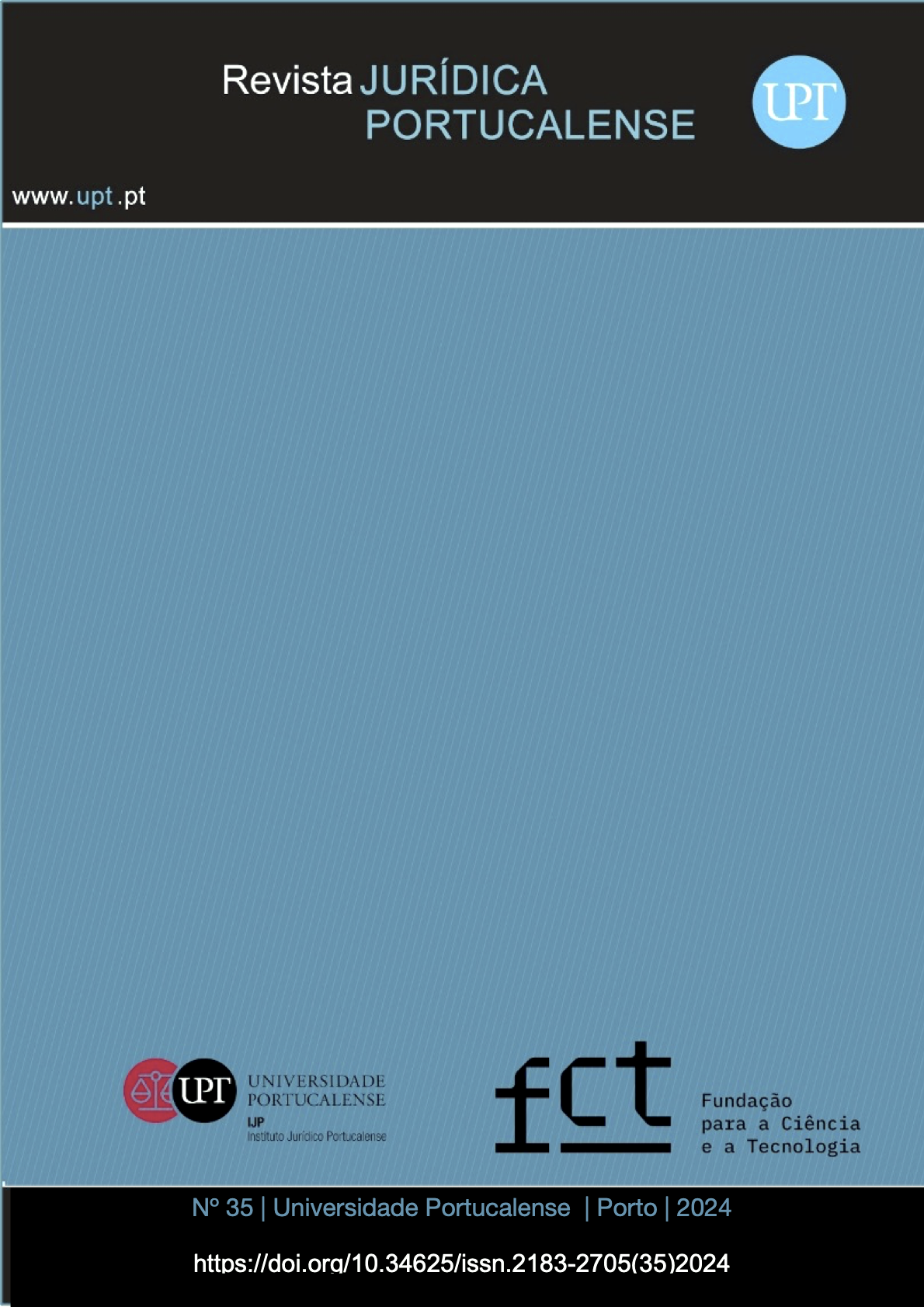A maternidade de substituição em Portugal: uma visão a partir das práticas internacionais
DOI:
https://doi.org/10.34625/issn.2183-2705(35)2024.ic-09Palavras-chave:
Maternidade de substituição, Implicações legais, Implicações Éticas, Direito Comparado, Regulação, Perspetivas InternacionaisResumo
À medida que Portugal se prepara para implementar legislação sobre gestação de substituição, entra num domínio repleto de complexidades legais, éticas e psicológicas. Em todo o mundo, as jurisdições exibem abordagens diversas em relação à gestação de substituição, refletindo a diversidade cultural, ética e legal. Isso requer uma compreensão abrangente das implicações da gestação de substituição dentro de diferentes sistemas legais. Além disso, o impacto psicológico sobre as gestantes, os pais intencionais e os descendentes exige um exame cuidadoso. À medida que Portugal embarca nessa jornada, é necessário navegar por desafios éticos, garantindo a proteção de todas as partes envolvidas. Além disso, abordar lacunas de pesquisa e dilemas éticos será fundamental na elaboração de legislação que defenda os direitos e o bem-estar de todos os indivíduos afetados pela gestação de substituição.
Referências
ATTAWET, Jutharat. Reconsidering surrogacy legislation in Thailand. Medico-Legal Journal, 2022, 90.1: 45-48.
BLAKE, Lucy, et al. “Gay fathers’ motivations for and feelings about surrogacy as a path to parenthood”, Human Reproduction, 2017, 32.4: 860-867. https://doi.org/10.1093/humrep/dex026.
BLYTH, Eric. “I wanted to be interesting. I wanted to be able to say ‘I've done something interesting with my life’”: Interviews with surrogate mothers in Britain, Journal of reproductive and infant psychology, 1994, 12.3: 189-198. https://doi.org/10.1080/02646839408408885
BRANDÃO, Pedro, GARRIDO, Nicolás. Commercial Surrogacy: An Overview - Gestação de substituição comercial: Uma visão global, Revista brasileira de ginecologia e obstetrícia: Revista da Federação Brasileira das Sociedades de Ginecologia e Obstetrícia, vol. 44,12 (2022): 1141-1158. doi:10.1055/s-0042-1759774.
BRAGA, Maria de Fátima Gonçalves. A Procriação Medicamente Assistida e os princípios constitucionais da igualdade e não discriminação, Revista Jurídica Portucalense, n.º Especial Mecanismos de Proteção Jurídica no Direito Civil., 2023, pp. 57-74, https://doi.org/10.34625/issn.2183-2705(ne)2023.ic-04
CABAR, Fabio Roberto, e.a., Critical Analysis of The Changes in CFM Resolution 2294/21 And Its Impacts on Assisted Human Reproduction, JBRA assisted reproduction, Vol. 26,4 659-665. 9 Nov. 2022, doi:10.5935/1518-0557.20220007
FINKELSTEIN, Alex, e.a, Surrogacy Law and Policy in the US. Columbia Law School Sexuality and Gender Law Clinic, 2016
GUIMARÃES, Maria Raquel, “Subitamente, no verão passado: A contratualização da gestação humana e os problemas relativos ao consentimento, Debatendo a procriação medicamente assistida, Porto, FDUP, 16, 17/03/2017, p. 114.
JADVA, Vasanti, et al., Surrogacy: the experiences of surrogate mothers, Human reproduction, 2003, 18.10: 2196-2204. https://doi.org/10.1093/humrep/deg397
KUMAR, Pawan, et al. Surrogacy and women′ s right to health in India: Issues and perspective. Indian journal of public health, 2013, 57.2: 65-70
MILLBANK, Jenni. The new surrogacy parentage laws in Australia: cautious regulation or'25 brick walls'?. Melbourne University Law Review, 2011, 35.1: 165-207.
NELSON, Erin L. Gestational surrogacy in Canada. Handbook of Gestational Surrogacy, 2016, 123-30.
OLAYE-FELIX, Bianca, ALLEN, Deborah Emma, METCALFE, Neil H, Surrogacy and the law in the UK, Postgraduate Medical Journal, Volume 99, Issue 1170, April 2023, pp. 358–362, DOI: 10.1136/postgradmedj-2022-141625
PASHMI, Monir; TABATABAEI, Seyed Mohammad Sadegh; AHMADI, Seyed Ahmad. “Evaluating the experiences of surrogate and intended mothers in terms of surrogacy in Isfahan”, Iranian Journal of Reproductive Medicine Vol.8. No.1. Winter 2010, pp: 33-40.
PETERS, Henrike E., SCHATS, Roel, e.a., Gestational surrogacy: results of 10 years of experience in the Netherlands, Reproductive BioMedicine Online, Volume 37, Issue 6, 2018, pp. 725-731, https://doi.org/10.1016/j.rbmo.2018.09.017.
PIERSANTI, Valeria, et al. Surrogacy and “procreative tourism”. What does the future hold from the ethical and legal perspectives? Medicina, 2021, 57.1: 47. https://doi.org/10.3390/medicina57010047
SCHUZ, Rhona. Surrogacy in Israel: an analysis of the law in practice. Surrogate motherhood: international perspectives. Portland: Oxford, 2003, 35-54.
TANDERUP, Malene, PANDE Amrita, e.a., Impact of the war in Ukraine and the COVID-19 pandemic on transnational surrogacy – a qualitative study of Danish infertile couples’ experiences of being in ‘exile’, Reproductive BioMedicine Online, Volume 47, Issue 4,2023, https://doi.org/10.1016/j.rbmo.2023.06.013.
TORRES, Gloria, SHAPIRO, Anne & MACKEY, Tim K., “A review of surrogate motherhood regulation in South American countries: pointing to a need for an international legal framework, BMC Pregnancy Childbirth 19, 46 (2019). https://doi.org/10.1186/s12884-019-2182-1
VAN DEN AKKER, Olga. Genetic and gestational surrogate mothers' experience of surrogacy, Journal of reproductive and infant psychology, 2003, 21.2: 145-161. https://doi.org/10.1080/0264683031000124091.
WEIS, Christina. Surrogacy in Russia - An Ethnography of Reproductive Labour, Stratification and Migration, Emerald, 2021,DOI: 10.1108/9781839828966
XAVIER, João Proença. Gestacion por substitución (en perspectiva comparada): Análisis comparativo en contexto iberoamericano Portugual Brasil y España. Ratio Legis Libreria Jurídica. Salamanca (Espanha), 2019, pp. 28 a 32.
Downloads
Publicado
Como Citar
Edição
Secção
Licença
Direitos de Autor (c) 2024 Revista Jurídica Portucalense

Este trabalho encontra-se publicado com a Licença Internacional Creative Commons Atribuição 4.0.
Autores que publicam nesta revista concordam com os seguintes termos:
- Autores conservam os direitos de autor e concedem à revista o direito de primeira publicação, com o trabalho simultaneamente licenciado sob a Licença Creative Commons Attribution que permite a partilha do trabalho com reconhecimento da autoria e publicação inicial nesta revista.
- Autores têm autorização para assumir contratos adicionais separadamente, para distribuição não-exclusiva da versão do trabalho publicada nesta revista (ex.: publicar em repositório institucional ou como capítulo de livro), com reconhecimento de autoria e publicação inicial nesta revista.
- Autores têm permissão e são estimulados a publicar e distribuir o seu trabalho online (ex.: em repositórios institucionais ou na sua página pessoal) a qualquer ponto antes ou durante o processo editorial, já que isso pode gerar alterações produtivas, bem como aumentar o impacto e a citação do trabalho publicado (Veja O Efeito do Acesso Livre).
A RJP não aplica taxas de submissão, publicação ou de qualquer outra natureza, sendo os artigos publicados em acesso livre e aberto, com a missão de difusão do conhecimento científico e o debate de temas jurídicos na área das Ciências Jurídicas.






